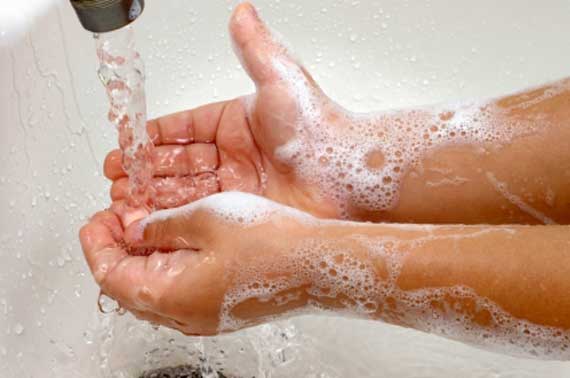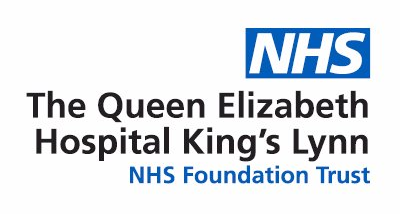Infection prevention and control
Working together - How patients can help
Hand hygiene
The most common way germs are spread is by people's hands. Making sure your hands are clean is the single most important thing you can do to help reduce the spread of infection.
Using soap and water is recommended if hands are visibly dirty or if you have been suffering from diarrhoea and/or vomiting (hand gel is ineffective). Hand washing is particularly important before eating and after using the toilet. Hand gel is very effective for cleansing hands at other times. Healthcare staff are taught a set of steps to follow to ensure they don't accidentally miss any parts of their hands and can help you to learn this technique too.
Hand gel is available in hospital for staff, patients, and visitors to use.
If you find you don't have a gel dispenser at the end of your bed, or if you go
to use a dispenser that you find is empty, please report this to the ward staff
so they can ensure it is refilled. The hospital also provides anti-bacterial
hand wipes for all patients. You will be offered these at every meal-time. If
you require assistance to perform hand-hygiene at any time, please ask a member
of staff. Healthcare staff are aware that they also need to cleanse their hands
before caring for you and it is okay to ask if you have not seen this happen.
Personal belongings
Please help the ward cleaning staff by keeping your locker and table top as clutter-free as possible so that they can clean these properly each day.
Please also do not store uncovered food or fruit on locker tops and bed tables and please check with the Ward Manager first before asking visitors to bring food into hospital for you.
It is important your belongings are stored in the locker and not on the floor, this is not only to aid thorough cleaning but to also ensure safety at all times.
If you are concerned about levels of cleanliness, please report to the Ward Manager to action immediately.
Please bring your own toiletries with you when you come to hospital. During your stay you may be asked to wash daily with an antimicrobial body wash (also suitable for washing hair). This is a preventative measure to reduce the risk of acquiring MRSA during your stay. A named bottle for your use only will be provided to you. Please ensure the ward staff have supplied this along with directions for its use upon your admission. You can freely use your own toiletries following its application – this will not affect its antimicrobial action.
Visiting
We understand how important visitors are for recovery and reassurance and we know how much our patients look forward to visiting. We kindly ask that visitors are kept to a minimum at any one time.
In order to protect your family, young children (under the age of 12) and babies should not visit unless this has been agreed with the Ward Manager. (We may have patients with undiagnosed/suspected infections in bays on the ward).
Please encourage your visitors to use the hand gel as they enter and leave the ward. It is also important that your visitors do not sit on your bed, and that they don't touch dressings, drips, or other equipment around you and your bed.
Please also ask visitors who are unwell or if they have been in contact with someone who has been unwell (sickness, diarrhoea, cold for example) not to visit.
Please also let us know if you have been in contact with any illnesses which
the staff caring for you may need to be aware of e.g. vomiting and diarrhoea,
flu, shingles, chicken pox, measles. Also please let us know if you have been a
patient in hospital in the last 12 months.
Isolation
If you have an infection you may be asked to stay in a single room or you may be cared for in a bay where there are other patients with the same infection. If this happens, it will be fully explained to you and your family. For your own safety and for the safety of other patients, please follow the isolation procedures explained to you and stay in your room or by your own bed if you are asked to do so.
Isolation
If you have an infection you may be asked to stay in a single room or you may be cared for in a bay where there are other patients with the same infection. If this happens, it will be fully explained to you and your family. For your own safety and for the safety of other patients, please follow the isolation procedures explained to you and stay in your room or by your own bed if you are asked to do so.
Further information
The clinical teams in each ward/department will provide information and support for you during you stay. If you have any additional queries about infection prevention and control measures you can ask for a member of the team to visit you to discuss these further.
The IPAC are available to contact via switchboard on 01553 613613 on ext. 2325.

